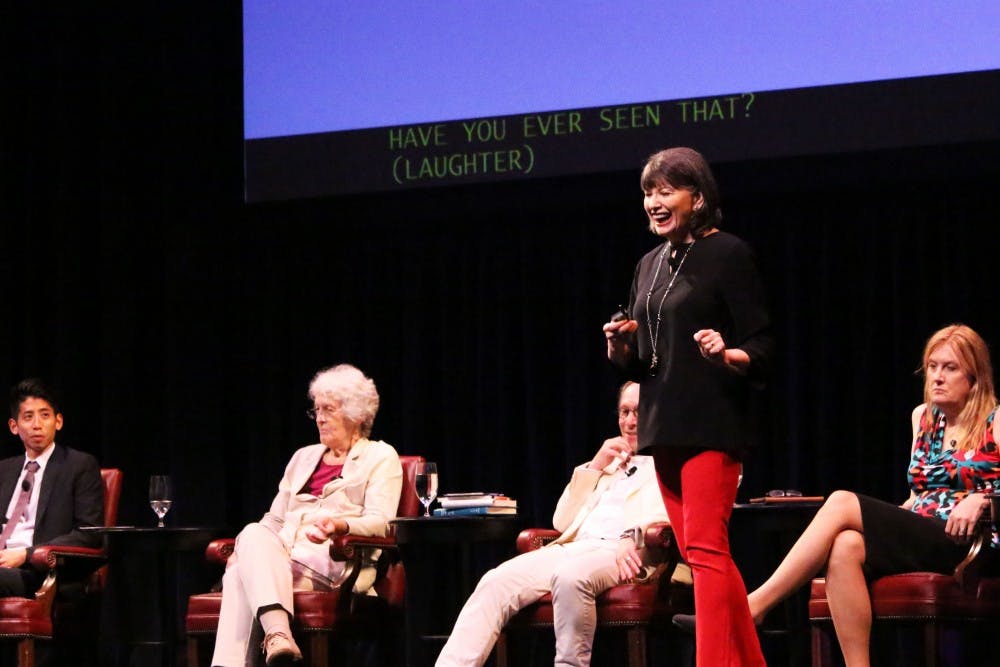A forum hosted by the ASU Origins Project, The Great Debate: Political Bodies - Sex, Gender, and Reproductive Rights, showcased intellectually stimulating discourse of social injustices faced by people from all walks of life in the 21st century.
The debate's six participants discussed the social challenges faced by the LGBT+ community, the future of women’s rights and the difference between sex and gender during the Sept. 7 event at the Phoenix Orpheum Theatre.
Lawrence Krauss, founder of the ASU Origins Project, moderated the discussion among six professionals, who advocate for gender and sexual equality as authors, professors, business leaders and judicial figures.
If you missed the two-hour event, here are six points you missed:
1. Gender development is fluid and lifelong.
Anne Fausto-Sterling, a professor of biology and gender studies at Brown University, focused her speech on gender identity’s path throughout childhood growth.
She said gender identity is something that changes dynamically in one’s psychology throughout a developmental timeline.
"It doesn't just start, and then it's done," she said. "It's a constant development."
2. Sex and Gender are not interchangeable terms.
Kaiponanea Matsumura, an associate professor of law at ASU, followed Sterling’s speech by framing sex and gender through the eyes of the Supreme Court.
According to the American Psychological Association, sex is defined as the biological differences among men, women and intersex individuals, while gender is defined as the behaviors and attitudes culturally associated with one's sex.
“The courts have been very imprecise in their use of the terms ‘sex’ and ‘gender’ when talking about the constitution,” he said. “Clearly, there is a lot of complexity to how we understand the constructs of sex and gender, and they’re just really simplified in the way courts address those constructs.”
Matsumura said the transgender community has found recent success by challenging the courts to think about the changing concepts of sex and gender. He also said same-sex marriage bans have been justified by the assumption that genders are inherently different, leading to false stereotypes and a harmful emphasis on gender roles.
3. Transgender lives are a personal journey.
The third panelist began with a slideshow illustrating the life of Phyllis Randolph Frye, who once went by Phillip. Phyllis was a high-school football player and former Texas A&M University Army cadet who struggled with her gender identity.
Frye, also the third speaker of the debate, was the first openly transgender judges in the U.S.
She discussed the North Carolina Bathroom Bill, an initiative pushing for single-sex bathrooms despite the growing needs of the transgender community, and caused audience members to laugh along with common observations from the transgender community.
“Transgender people don’t go to the restroom to cause a disturbance,” Frye said. “Transgender people go to the restroom to go to the restroom.”
4. The human race doesn’t have to thrive on heterosexuality.
LGBT+ author Jennifer Finney Boylan said one of the major arguments against homosexuality is that it goes against the biological nature of reproduction. However, she said that concept is not the case.
Boylan said most of the problems in the world are rooted in an indifference to understand the lifestyles of those who live differently — particularly homosexuals and bisexuals.
She emphasized that members of the LGBT+ community are people too, and that once people decide to become more understanding of those who are different, the human race can take a leap forward in terms of advancement.
5. More women in the workforce is essential for progress.
Gloria Feldt, the former president of the Planned Parenthood Federation of America, addressed oppression faced by cis-gender women. These women currently identify as the gender with which they were assigned at birth.
She said the wage gap and general exclusion of women from the workplace hinders social and economic progress.
According to a study by the McKinsey Global Institute, narrowing the pay gap and advancing gender parity in the workplace can potentially add $12 trillion to global growth.
"In order to put more women in the workplace, we have to make it more hospitable," Feldt said. "This is a big moment where there can be big steps taken forward."
6. The future of equality is in our hands.
Speaking for those of the LGBT+ community, Boylan said to not be afraid of the progress necessary for making a safer world for those oppressed by inequality and indifference.
"If you're part of our community, come out and be known," she said. "If you're not ... when you hear somebody at ASU say something mean about transgendered people or gay people, don't be silent, speak up and say that's not cool."
Frye said if people don't act, the law as it currently exists will continue to affect those who have been wronged.
"Vote," she said. "You've got to vote, you've got to go to your state capital, you've got to lobby, you've got to get involved."
Reach the reporter at angel.n.mendoza@asu.edu or follow @angelnikolas96 on Twitter.
Like The State Press on Facebook and follow @statepress on Twitter.




